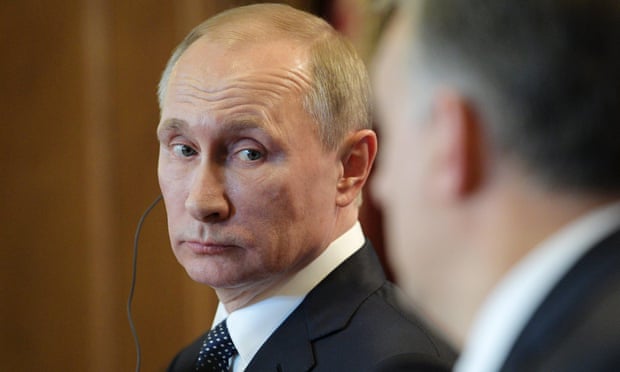Vladimir Putin wants to extend his influence beyond the ballot box and into the very fabric of our public life. We must take action before it’s too late
 Illustration by Sébastien Thibault
Illustration by Sébastien Thibault
The Russian hacking of the Democratic National Committee (DNC) and members of Hillary Clinton’s campaign is being treated too much like a novelty and not enough as a serious and persistent security threat. The problem becomes more urgent as we see it spread to other countries.
WikiLeaks, which disseminated stolen DNC documents, announced last week that it would turn its attention to France, and has released material relating to presidential candidates François Fillon and Emmanuel Macron, opponents of Marine Le Pen.
US intelligence agencies found clear linkgebetween Wikileaks and the Russian state; we have to assume Russia will use these to undermine Vladimir Putin’s arch-nemesis, Angela Merkel, when she faces the far-right Alternative für Deutschland at the polls in September.
But there’s a deeper dimension to Russia’s actions, which deserves the free world’s urgent attention: its capacity to silently influence domestic legislation and policy-making between elections.
Leaders in the US and Europe must stop any attempt by Trump to ease sanctions on Russia
With his success in the US last year, Putin has put opponents on notice that there will be a price to pay for crossing him. Indeed, the complex infrastructure that Russia builtto infect public discourse with false or stolen information isn’t going anywhere. It can be unleashed at any time, on any issue, domestic or international.
This came into sharp relief this weekend when President Trump implied a sort of moral equivalence between the Putin regime and the US, a stunning reversal of long-standing policy. We are no longer talking about how to confront Russia, but whether we should confront it at all – a big win for Putin. Trump and the vice-president, Mike Pence, have also been frighteningly tentative about whether to maintain sanctions against Moscow.
But the example of President Trump is somewhat deceptive. Russian oligarchs eager to park their money in overseas real estate have been such an integral part of Trump’s personal fortune, and Putin’s role in this election was so outsized, it’s no wonder Trump is friendly. We may think that Trump is different – that his presidency, and this Russia problem, is temporary. Not so.
 Photograph: Alexei Druzhinin/Kremlin/EPA
Photograph: Alexei Druzhinin/Kremlin/EPA
What the Russians are doing by stealing documents, spending unlimited amounts of money and creating and distributing “fake news” has the potential to corrupt our political system to its core, if it hasn’t already. If Russia invades the Baltic states, could US assistance to them die in Congress because elected officials fear Russian retaliation? It sounds unbelievable, but we saw the GOP mysteriously change its platform this summer, removing aid to Ukraine – and that was before Putin proved his influence over the election.
Take the example of Senator Marco Rubio, who used a recent US Senate confirmation hearing to call Putin out for his aggression towards Ukraine and support for the Bashar al-Assad regime. “We are not the same as Putin,” Rubio tweeted this weekend in reaction to Trump’s remarks. If Rubio decides to run for president in 2020, should he expect Russian hackers and their social media distribution system to team up and punish him – in the way that, say, the billionaire Koch brothers spent millions of dollars on negative advertising to punish Democrats for seeking to pass a national carbon policy in 2010? I can’t see any reason why not. Nor can I see any reason for China and other countries not to follow suit.
We have to take action now to root out Russian and other foreign influences before they become too deeply enmeshed in our political ecosystem. First and foremost, leaders in the US and Europe must stop any attempt by the Trump administration to ease sanctions on Russia. It must be abundantly clear that attacking our elections through cyberspace will prompt a tough and proportional response.
Second, all democratic governments must do much more to make electoral systems secure. That doesn’t just mean steps to protect ballots: political parties and their leaders must be defended as well. We also need stiff penalties for individuals who assist Russian intervention in our elections, as it seems aides of Trump may have done.
Facebook and Twitter have taken encouraging steps to filter out misleading content. Their continuing vigilance will be critical. We must also think about how to manage the presence of government-backed news operations, such as Russia Today (rebranded as the more opaque RT) which can increase their reach through online promotion. The law makes no distinction between the New York Times and outlets like RT or China Daily, which are essentially state-sponsored propaganda. Sadly, the unfiltered nature of much social media means many Americans don’t see much of a distinction either.
Lastly, we must forcefully hold our elected officials accountable for addressing this. We need to make the repudiation of foreign interventions a campaign issue. In the US, we must call for protection against outside influence as frequently and vigorously as we have been calling for reforms to election financing, to give just one example.
For liberal democracy to survive, we have to “drain the swamp”, as Trump says. That must now include sapping the power of foreign adversaries to corrupt our public life.
Comments
Post a Comment